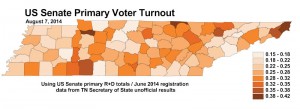Mike Knotts, director of government affairs
Thinking back to high school, there were two words that every student always dreaded to hear. These two words struck fear into hearts, exposed students who failed to complete their overnight studies and often lowered grade point averages of the unprepared: Pop quiz.
Well, I have a pop quiz of my own for you: What are the two most powerful words in the English language?
Usually your first thought is the best. I’d love to read your answers, so please email them to thetennmag@tnelectric.org. I’ll include some of the best responses in a future column.
I think I am going to ask my four young sons this same question soon, and I sure hope they’ve been taught enough respect and good manners to answer with the words “thank you.” There is no doubt in my mind that a polite and respectful attitude toward others is a huge advantage in this world. And simply saying “thank you” is a great start toward that kind of attitude. As the old adage goes, “You catch more flies with honey than you do with vinegar.”
More seriously, I’m reminded of one of my pastor’s favorite teachings. He will often ask, rhetorically, “How many people do you know who came to faith because someone else scolded them about their shortcomings?” Something about glass houses almost always comes to mind when I hear that question.
Yes, I’d like to instill kind spirits and grateful hearts in my boys. But let’s be honest. At this stage of their lives, I know what their answers will be. Their answers will be about the one thing that gets them up in the morning, keeps them up late at night and occupies most of their dreams and aspirations. It is why they know every word to a John Fogerty song. So, I’m pretty certain that when I ask them the two-most-powerful-words question, each, without hesitation, will answer, “Play ball!”
While I know that many of you are already preparing for football season, just know that you don’t have to wait for a weekend in the fall to enjoy a beautiful Tennessee experience outside with your family and friends. There are nine professional baseball teams across the state, and their fun-filled games don’t require a second mortgage to pay for field-level seats and a great hot dog. A love for the game is all that’s needed to ensure a great experience.
Northeast Tennessee offers four teams, all within an hour’s drive of each other and all competing in the Appalachian League of Professional Baseball Clubs. As one of the first stops for players who sign contracts after the major league draft in June, you never know which of tomorrow’s big-league All-Stars you may catch suiting up for their first professional baseball games. The Kingsport Mets, Johnson City Cardinals, Greeneville Astros and Elizabethon Twins make up four of the five teams in the Western Division, and each is affiliated with the major league counterpart that shares its mascot. It is exciting to see the vigor and enthusiasm of the players as they begin their journey.
There is great fun to be had, too, at either end of the state as Tennessee has three Double-A minor league teams competing in the Southern League. The Jackson Generals, part of the Seattle Mariners family, play in Pringles Park, conveniently located just off Interstate 40. As Chattanooga’s downtown has blossomed over the past few years, the Lookouts, a Minnesota Twins affiliate, have a built great home just up the hill from the Tennessee Aquarium. And on your next trip to Gatlinburg, don’t forget that the Tennessee Smokies (who play in Kodak, near Sevierville) currently are farming players for the Chicago Cubs.
While Tennessee may not boast a major league franchise just yet, two of the best places to watch a baseball game anywhere in America are right here in the Volunteer State. The Triple-A Memphis Redbirds are not just an affiliate of the St. Louis Cardinals, one of the perennial powerhouses of Major League Baseball. The Memphis team is actually owned by the St. Louis franchise. Each play has a big-league feel because each player is only one phone call away from “The Show.” The Redbirds play home games right off historic Beale Street in downtown Memphis at AutoZone Park — quite possibly one of the finest minor league baseball stadiums ever built.
And the newest minor league ballpark in the country is in one of the hottest neighborhoods of one of America’s best boomtowns. First Tennessee Park is the home of the Nashville Sounds, and I’d be willing to bet that many of the players for Nashville’s big-league counterpart, the Oakland A’s, wish they could lace ’em up at a field as inviting as Nashville’s. With the iconic guitar-shaped scoreboard and a perfect view of the city skyline, there’s no doubt that Music City is a great place for baseball.
While my boys’ choice may not change the world, they are words that can change your outlook on what a great night in Tennessee could be. So when the umpire shouts, “Play ball!” I hope you experience America’s pastime and leave with your spirit just a bit more grateful for this great place we call home.
Photo courtesy of First Tennessee Park.





